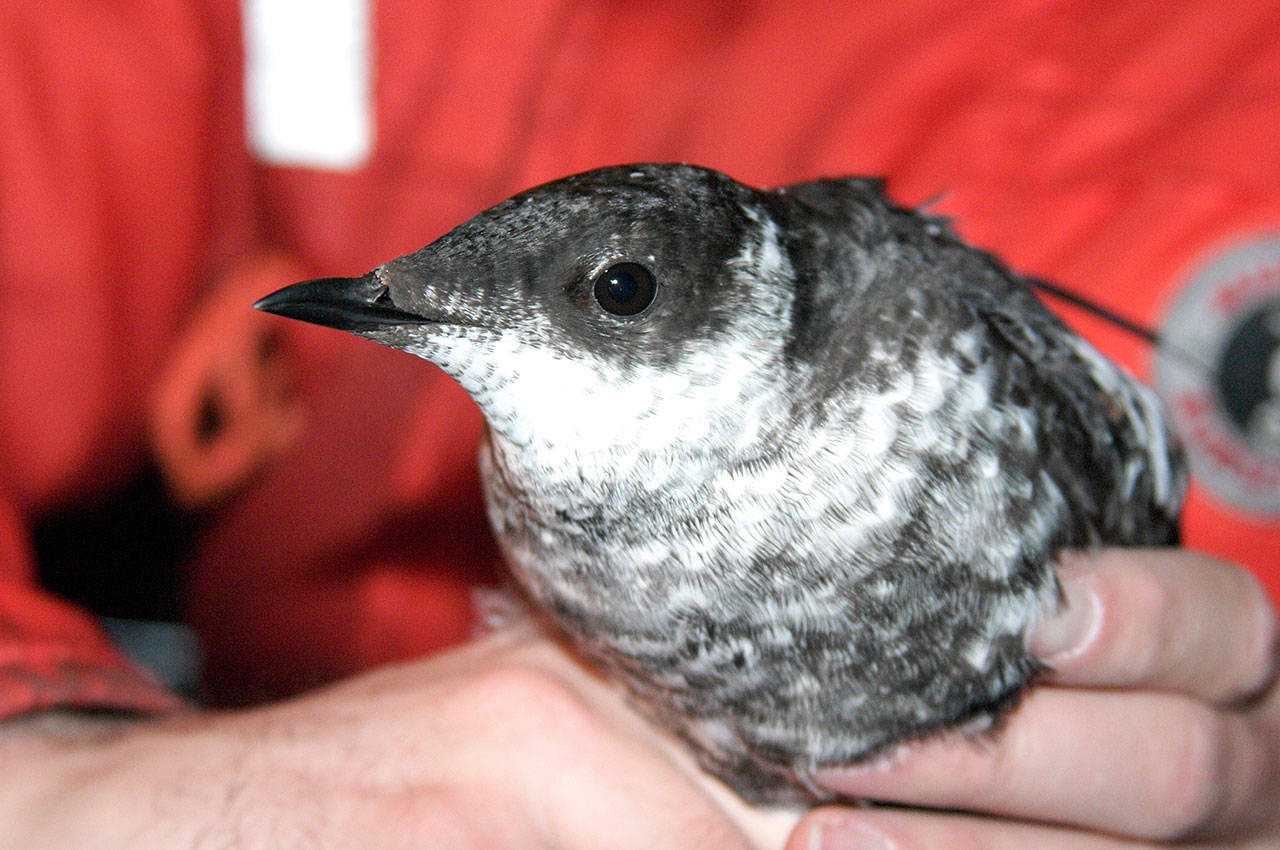PORT ANGELES — Several West End officials have expressed concerns about what the preferred alternative for the Marbled Murrelet Long-Term Conservation Strategy means financially for the most rural communities in Clallam County.
The city of Forks, Quillayute Valley Park and Recreation District, Quillayute Valley School District, Clallam Fire District No. 4 in Joyce and the Board of Clallam County Commissioners have all signed letters to the state Board of Natural Resources over their concerns.
The Final Environmental Impact Statement (EIS) on the plan to protect the threatened seabird was released in September and has been criticized by local officials for lacking adequate financial analysis.
The 1,590-page document says the state’s preferred alternative will protect 168,000 acres of current murrelet habitat while decreasing the number of operable acres on Clallam County’s West End.
The EIS shows that Clallam County, which currently has 46,000 operable acres — lands open to timber harvest — will see an overall increase of 1 percent of operable lands under the preferred alternative.
However, it also shows that West End junior taxing districts, which rely heavily on revenues from timber sales, will face drops in their operable acres if the preferred alternative is adopted.
“The plan calls for setting aside thousands of acres of second and third growth timber stands that are not, nor will they become, habitat suitable for marbled murrelets over the life of the plan,” a letter from the city of Forks, Quillayute Valley Park and Recreation District and Quillayute Valley School District says.
“It also calls for hundreds of acres of timber stands that are newly replanted to be set aside. Setting aside these plantations and younger stands won’t benefit the marbled murrelet and will squander millions of dollars of trust investments in reforestation and silviculture activities.”
Under the plan, Clallam Fire District No. 5 would lose 14.1 percent of its operable acres, Cape Flattery School District would lose 13.9 percent of its operable acres, Clallam Fire District No. 4 would lose 6.4 percent of its operable acres, Crescent School District would lose 5.3 percent of its operable acres and the Forks Community Hospital district would lose 2.9 percent of its operable acres.
Clallam County Commissioner Bill Peach, who is also vice chair of the Board of Natural Resources, criticized the plan during a Board of Health meeting involving state lawmakers last week.
He has said the FEIS fails to acknowledge the economic impacts to minority groups, particularly Native Americans and low-income families living on the West End.
“There are areas in Washington state that are disproportionately impacted,” Peach said Thursday.
Peach said the Board of Natural Resources expects to make a decision during its Dec. 3 meeting in Olympia.
The marbled murrelet is a small, fast-flying seabird that only comes on land to lay eggs and rear its young, spending the rest of its life at sea. Murrelets lay one egg per year, setting them only atop large moss-covered branches high in the forest canopy within 55 miles of saltwater.
DNR manages 14 percent of existing marbled murrelet habitat in Washington state. The U.S. Fish and Wildlife Service considers DNR-managed land in Clallam, Pacific and Wahkiakum counties to be important habitat to the conservation of the species, of which approximately 6,000 are believed to remain in Washington state.
The bird is listed as “threatened” and less than 2 percent of its population is in Washington, with 94 percent of its population living in Alaska or British Columbia, according to DNR.
Clallam Fire District No. 4 has urged state officials to see for themselves some of the areas that would be set aside from management.
Voters in Clallam Fire District No. 4 approved a levy-lid lift during the general election. Officials said that levy was needed because of declining timber revenue.
“Setting aside lands that will not become habitat over the life of the plan (indeed for centuries) is a significant deviation from the fiduciary duty the Department owes to the trust beneficiaries as manager of their trust,” the letter from Clallam Fire District No. 4 says.
“Loss of volume in our counties, regardless of which trust, will have negative impacts on our revenues from timber excise taxes as well as local jobs.”
________
Reporter Jesse Major can be reached at 360-452-2345, ext. 56250, or at jmajor@peninsuladailynews.com.

